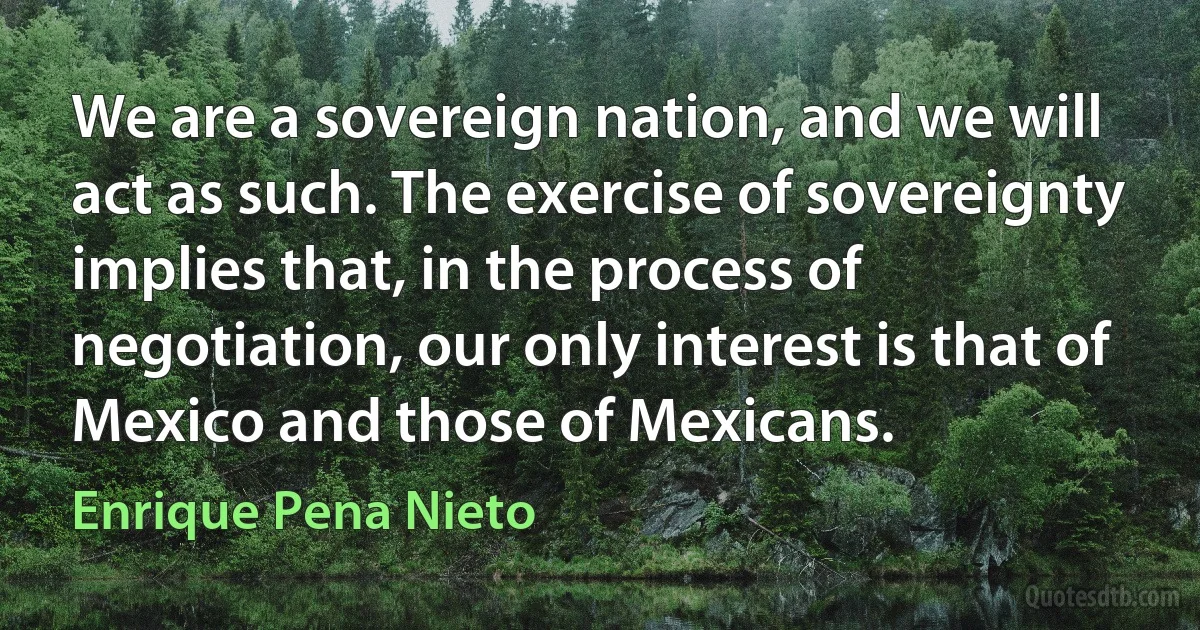Sovereignty Quotes - page 9
My real object is the establishment of jihãd against the Sikhs of the Punjab and not to stay in the countries of Afghanistan and Yagistan. The long-haired infidels who have seized sovereignty over Punjab are very experienced, clever and deceitful... The ill-natured Sikhs and the ill-fated polytheists have gained control over the Western parts of India from the banks of Indus to the capital city of Delhi.

Syed Ahmad Barelvi
The world as a whole is full of problems and difficulties and it is most important that every country which loves its Freedom and wants to maintain its Independence and sovereignty should work for peace and try to see that there is disarmament in the world which alone will lead to real peace.

Lal Bahadur Shastri
We must not forget that the world needs to be fed. France and Germany, for example, use more than 50% of their territories for agriculture, while Brazil only uses 8% of its land for food production. 61% of our territory is preserved! Our policy is zero tolerance for crime, including environmental crimes. I reiterate that any initiative to help or support the preservation of the Amazon rainforest, or other biomes, must be treated in full respect of Brazilian sovereignty. We also reject attempts to instrumentalize environmental issues or indigenous policy in favor of foreign political and economic interests, especially those disguised as good intentions. We are ready to harness our full potential sustainably through partnerships and added value.

Jair Bolsonaro
But the right to make the final judgment who was responsible for the deaths and on the nature of punishment should rest with the judicial system of Sri Lanka. The judicial system in Sri Lanka was in shambles earlier, but now it is returning to normal. The sovereignty of each country must be respected in such issues.

Ranil Wickremesinghe
When Sultan Mahmud ascended the throne of sovereignty, his illustrious deeds became manifest unto all mankind within the pale of Islam when he converted so many thousands of idol temples into masjids. He led an army to Nahrwalah of Gujarat, and brought away Manat, the idol, from Somnath, and had it broken into four parts, one of which was cast before the entrance of the great Masjid at Ghaznin, the second before the gateway of the Sultan's palace, and the third and fourth were sent to Makkah and Madinah respectively.

Mahmud of Ghazni
The United Front Government's neighbourhood policy now stands on five basic principles: First, with the neighbours like Nepal, Bangladesh, Bhutan, Maldives and Sri Lanka, India does not ask for reciprocity but gives all that it can in good faith and trust. Secondly, no South Asian country will allow its territory to be used against the interest of another country of the region. Thirdly, none will interfere in the internal affairs of another. Fourthly, all South Asian countries must respect each other's territorial integrity and sovereignty. And finally, they will settle all their disputes through peaceful bilateral negotiations. These five principles, scrupulously observed, will, I am sure, recast South Asia's regional relationship, including the tormented relationship between India and Pakistan, in a friendly, cooperative mould.

I. K. Gujral
The Gujral doctrine is a doctrine of good neighbourliness. In South Asia, India is the largest country and the largest economy. All the countries of the neighbourhood put together cannot match India. Therefore, it is my doctrine, that in the post-Cold War era, all the neighbours must look up to India as a friendly neighbour. For doing so, if concessions have to be given, they should. But these concessions do not include two things: no transfer of sovereignty of any part of India, including Kashmir; and second, we will not compromise on our basic secular, democratic polity. Minus these two factors, we are willing to give concessions as long as it does not hurt our defence.

I. K. Gujral
This country has become an independent Republic with complete sovereignty. This has been laid down in our Interim Constitution. This country is to be shared by the citizens, the Arabs and the Kurds. This entity is indivisible in any way. No one can divide nor disintegrate the Republic of Iraq from the North to the South and from the East to the West.

Abd al-Karim Qasim
On this day, as we celebrate the 68th anniversary of our Independence, we are proud of the progress made towards safeguarding the freedom, sovereignty, territorial integrity of the Nation and strengthening national reconciliation and economic and political rights of all our citizens.

Maithripala Sirisena
There are many serious political scientists who have argued that the age of sovereignty is over. They want a frontier less, borderless world, and that is a very dangerous philosophy which may suit the most developed and powerful countries of the world, and not those who are small and developing. That is why we are rather cautious in our liberalisation policy. We went ahead in certain sectors. We went rather slowly in other sectors. And, this has helped us.

K. R. Narayanan
The worst thing about Nigeria is that here is a nation that has so much potential but the only problem is that everybody seems unprepared to face the problems or the realities of the Nigerian situation. There is absolutely no way you can look at the Nigerian federation, the way it was conceived, and say it is a good federation. One of the federating units is bigger than the other units. The other thing is that everything that has worked in Nigeria, or appears to have worked, seems very much to have been an imposition. The idea that sovereignty belongs to the Nigerian people is all fiction as far as Nigeria is concerned.

Chukwuemeka Odumegwu Ojukwu
Maithripala Sirisena: I must say very clearly there is no allegations regarding 'war crimes', there were war crime allegations during the early stages. But at the UN Human Rights Council in Geneva, mainly in the proposals presented in September, there were no war crime allegations against us. They contained allegations of Human Rights violations only. When you consider the facts surrounding the allegations of human rights violations, we're committed as a member of the UN to implementing the main points and proposals. But within that commitment, we will always act in accordance with the sovereignty of our country and in accordance with our constitution. For this work, we can obtain foreign technology in certain areas. In terms of people we definitely do not need outsiders. We have an unbiased independent judiciary in this country. We have a Criminal Investigation Department and other institutions that can carry out unbiased investigations in this regard.

Maithripala Sirisena
But true kingship, which pertains to the divine essence, is still and always shall be in its own station. On the outward plane, the prophets are constant in their sovereignty. They continue until such time as God changes his sacred law. At that time, their dispensations are dissipated. Nevertheless, the sovereignty of the prophets and their religions is everlastingly present in every religion, indeed, in every person who claims to follow those prophets. In sum, such a one has attained leadership, and passes a few days of his life, according to his belief, being a sovereign, until such time as God raises him up to him.

Subh-i-Azal



